
We kindly inform you that, as long as the subject affiliation of our 300.000+ articles is in progress, you might get unsufficient or no results on your third level or second level search. In this case, please broaden your search criteria.

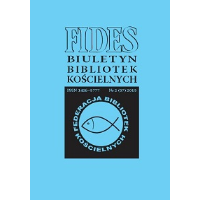
Zbiory sandomierskiej biblioteki ze względu na swój zły stan wymagają podjęcia natychmiastowych prac ratowniczych mających na celu zabezpieczenie księgozbioru. Niestety ograniczony budżet przeznaczony na funkcjonowanie biblioteki nie daje możliwości samodzielnego opłacenia kosztownych prac, w związku z tym każdego roku biblioteka stara się o dofi nansowanie ze środków publicznych. Najcenniejsza część zbiorów Biblioteki Diecezjalnej w Sandomierzu figuruje w rejestrze zabytków ruchomych województwa świętokrzyskiego, co dało podstawę do ubiegania się o dofinansowanie zadania w ramach programu Ministerstwa Kultury i Dziedzictwa Narodowego. W 2011 roku stworzono wniosek: „Sandomierz, Biblioteka Diecezjalna – inkunabuły i starodruki (XV-XVIII w.): prace ratownicze polegające na dezynsekcji, odkażaniu, czyszczeniu i zabezpieczeniu 17 inkunabułów i 502 starodruków” i zgłoszono w pierwszym naborze do programu „Dziedzictwo kulturowe”, priorytet : „Ochrona zabytków”.
More...
Rudy to jedno z górnośląskich opactw cysterskich. Filią Rud było opactwo w Jemielnicy. Rudzkie opactwo powstało w połowie XIII wieku, istniało do sekularyzacji dóbr kościelnych na Śląsku w 1810 roku. Przez wieki w wieloraki sposób przyczyniło się do rozwoju kultury Górnego Śląska4. Rudy zasłynęły m.in. prężnym skryptorium i bogatą biblioteką, które działały w klasztorze w okresie średniowiecza5.
More...
Biblioteka klasztorna w Beuron, podobnie jak każda biblioteka szkolna, uniwersytecka i inna, jest częścią instytucji służącej realizacji postawionych jej celów i zadań. Rola biblioteki klasztornej wykracza jednak znacznie poza funkcje przypisane zwykłej bibliotece. Biblioteka klasztorna służy zakonnikom (Kościołowi), służy nauce, służy też społeczeństwu. Z uwagi na wielowiekową historię biblioteka klasztorna jest też często skarbnicą pamięci o przeszłości ukrytej w księgach rękopiśmiennych, w inkunabułach, później – w starych drukach.
More...
Rosnące zainteresowanie czytelników było impulsem do opracowania akt archiwalnych Wyższego Seminarium Duchownego w Sandomierzu. W trakcie prac nad materiałami narodził się pomysł napisania artykułu, aby w ten sposób zespół Akta Seminarium Duchownego w Sandomierzu 1818-1980 przybliżyć szerszemu gronu czytelników.
More...
Gazeta „Nasza Wspólnota” powstała z inicjatywy długoletniej polonistki II Liceum Ogólnokształcącego im. Marii Konopnickiej, Barbary Stawowczyk, i jej ucznia, Mateusza Toborka, oraz ks. Pawła Buchty, proboszcza parafi i pw. Świętych Apostołów Piotra i Pawła w Katowicach. W parafi i wychodziła już cotygodniowa gazetka „Wspólnota”, dlatego pierwotnie zaproponowano tytuł „Wspólnota bis”, jednak ostatecznie zatwierdzono tytuł „Nasza Wspólnota”.
More...
Zbiory Biblioteki Wyższego Seminarium Duchownego w Kielcach wzbogacają się w znacznym stopniu dzięki księżom darczyńcom bądź testatorom. Są to głównie dary od księży profesorów WSD (w tym biskupów kieleckich), chociaż trafi ają się także książki przekazywane przez innych księży bibliofi lów z terenu całej niemal diecezji. W zbiorach uzyskanych w ten sposób od czasu do czasu można odnaleźć tzw. święte obrazki, przedstawiające wizerunki Pana Jezusa, Jego Matki, świętych, błogosławionych, przybliżające różne części Polski i świata związane z miejscami kultu drogimi katolikom. Obrazki tego typu już niejeden raz budziły zainteresowanie.
More...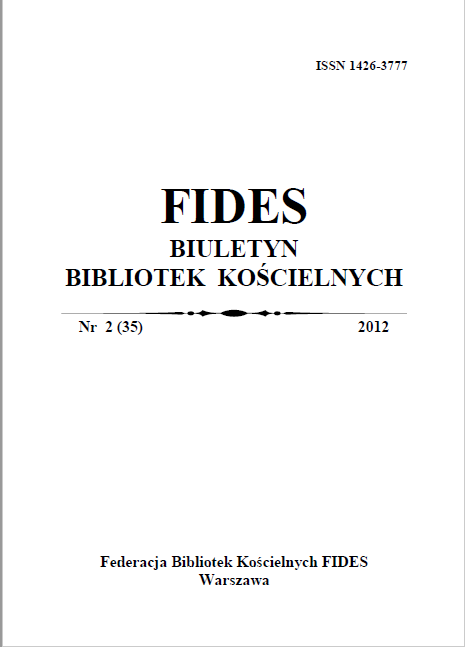
Biblioteka i książka od początku zajmowały niezwykle ważne miejsce w świecie klasztorów. Lektura zbiorowa i indywidualna stanowiła integralną część każdego zakonnego dnia, dlatego „kto nie umiał czytać, nie mógł być zakonnikiem”. Już Reguła św. Benedykta formułuje obowiązki spoczywające na bibliotekarzu. Konkretne przepisy określały drobiazgowo czas, miejsce i formę lektury, a z biegiem czasu zakony formułowały szczegółowe zasady dotyczące funkcjonowania bibliotek. Wymienia się ok. siedemdziesięciu przepisów (z lat 1570-1763) odnoszących się do tego problemu, tj. kwestii gromadzenia, opracowywania, porządkowania, przechowywania i wreszcie udostępniania.
More...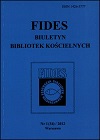
Archidiecezja gnieźnieńska przeżywa obecny rok jako Rok Stefana Kardynała Wyszyńskiego, chcąc upamiętnić 100. rocznicę urodzin, sześćdziesiątą piątą rocznicę przyjęcia sakry biskupiej oraz trzydziestą rocznicę jego śmierci. Biblioteka Prymasowskiego Wyższego Seminarium Duchownego w Gnieźnie podjęła starania, aby z posiadanych zbiorów wydobyć jak najwięcej informacji dotyczących pobytu Prymasa Tysiąclecia w gnieźnieńskim seminarium. Zebrane materiały oraz pamiątki zostaną wykorzystane do przygotowania ekspozycji, która będzie towarzyszyć licznym uroczystościom z okazji wspomnianego roku jubileuszowego. Zgromadzone materiały można podzielić na następujące grupy...
More...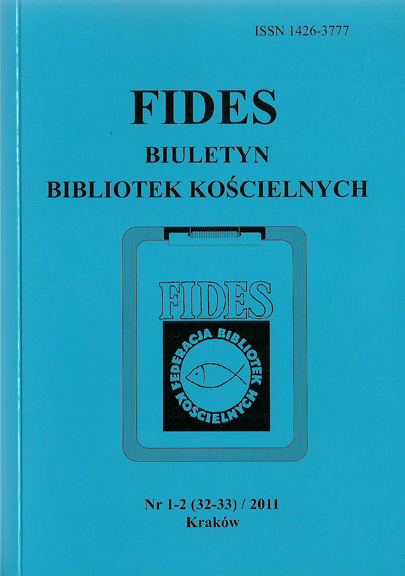
Przedmiotem przeprowadzonych prac konserwatorskich był starodruk Vita Christi Ludolfa z Saksonii, wydany w 1495 roku w Norymberdze. Należy on do księgozbioru misjonarskiego, nie ma niestety informacji ani znaków własnościowych wskazujących na poprzednich właścicieli, a przypomnijmy, że biblioteka zaczęła się kształtować dopiero w 1686 roku, czyli ok. 200 lat po wydaniu inkunabułu. Z dziejów starodruku pewne jest miejsce wydania, opisane w kolofonie na końcu dzieła – największa oficyna wydawnicza doby inkunabułów, Antoniusa Kobergera w Norymberdze.
More...
Słynne dzieło Ludolfa Kartuza z Saksonii o medytacjach na temat żywota Jezusa Chrystusa powstało ok. 1340 r. Data widniejąca w tytule (1495 r.) mówi tylko o jego norymberskim wydaniu, przechowywanym w Bibliotece Stradomskiej, a konkretnie o egzemplarzu, który stał się podstawą naszego omówienia2. Po skomplikowanej warsztatowo i bardzo pracochłonnej konserwacji, ten szacowny inkunabuł wraca do swojej biblioteki, by świadczyć o zapale intelektualnym autora dzieła, kunszcie dawanych drukarzy, ciągłości kultury chrześcijańskiej i naszej dbałości o jej zabytki.
More...
Zbiór starych druków będącego w posiadaniu Biblioteki Archidiecezjalnego Wyższego Seminarium Duchownego w Białymstoku, opiewa dziś dokładnie na 1436 woluminów i sięga początku XIX wieku, jest ściśle związany z biblioteką Seminarium Duchownego prowadzonego przez Zgromadzenie Księży Misjonarzy św. Wincentego à Paulo. Księża Misjonarze objęli parafię białostocką w 1806 roku. To właśnie dzięki Zgromadzeniu Księży Misjonarzy, którzy w Białymstoku prowadzili w latach 1820-1843 Seminarium Duchowne 3 i z tego powodu gromadzili książki dla użytku studentów teologii.
More...
Stanisław Adamski, trzeci biskup w dziejach Kościoła katowickiego, przeżył niewolę narodową i powstanie Drugiej Rzeczypospolitej, dwie wojny światowe, totalitaryzm hitlerowski i stalinowski, dwie deportacje z diecezji, wielki kryzys gospodarczy lat trzydziestych XX wieku, biedę i bezrobocie diecezjan, śląskie problemy narodowościowe i społeczne. Troska o zbawienie każdego powierzonego jego pasterskiej pieczy człowieka, jak i rozwiązywanie społecznych problemów, były przedmiotem działalności Biskupa najpierw podczas trzydziestu jeden lat posługi kapłańskiej w archidiecezji poznańskiej, a następnie w czasie trzydziestu siedmiu lat jego rządów w diecezji katowickiej.
More...
Przedstawiono całościowo zawartość treściową bibliotek duchowieństwa. Głównym kryterium klasyfikacji i podziału na poszczególne działy i poddziały była tematyka posiadanych przez księży książek. Wyjątek stanowią wydawnictwa albumowe oraz słownikowe i encyklopedyczne, a także przewodniki. Te publikacje ujęte są w odrębne działy wyróżnione ze względu na kryterium wydawniczo-formalne.
More...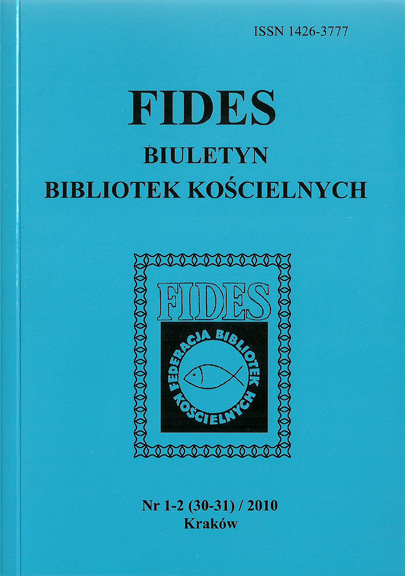
Gromadzenie zbiorów jako jedno z głównych zadań każdej biblioteki wiąże się z wykonywaniem szeregu czynności wynikających z potrzeb administracyjnych oraz z konieczności różnorodnego postępowania z materiałami, w zależności od ich źródeł nabycia oraz indywidualnych zasad przyjętych w danej bibliotece. Niezależnie jednak od pochodzenia każda książka winna być odnotowana w rejestrze przybytków, w księdze akcesji i inwentarzu, a następnie przekazana do dalszego opracowania.
More...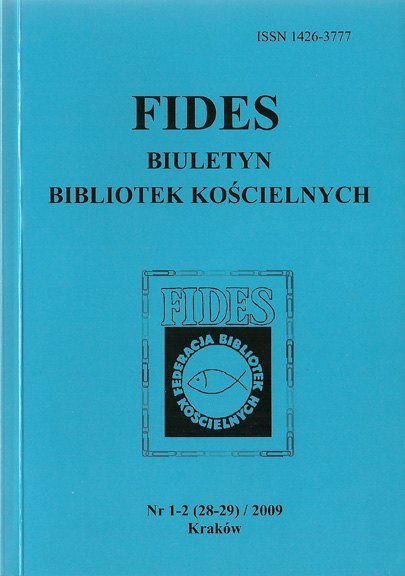
W XIII wieku pojawił się w Europie nurt religijności prywatnej. W praktykowaniu wiary posługiwali się osobistymi obrazami dewocyjnymi, zarówno zakonnicy, jaki i ludzie świeccy. Nurt ten propagowali dominikanie i franciszkanie. Pobożnym rozważaniom i modlitwie wierni oddawali się według wskazówek zawartych w poradnikach religijnych, które przybliżały im świętych i Chrystusa – człowieka. Była to literatura naówczas popularna, dzięki czemu wątki te mogły dotrzeć do szerszych kręgów wiernych.
More...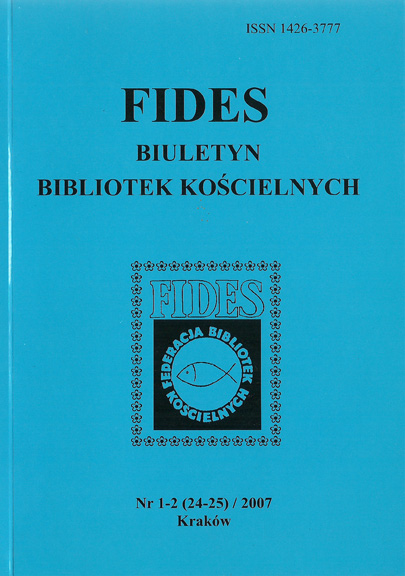
Do napisania tego artykułu skłoniły mnie przemyślenia nad ustawą o egzemplarzu obowiązkowym oraz praktyka nad gromadzeniem zbiorów w bibliotece Papieskiej Akademii Teologicznej w Krakowie. Po raz pierwszy egzemplarz obowiązkowy wprowadzono w 1537 roku w Bibliotece Królewskiej we Francji. Takie ustawy kolejno wprowadzały inne kraje, w Anglii w 1610 roku, 1661 w Szwecji, w 1683 Rosji, w 1697 w Danii, w 1780 w Polsce. Uniwersał z 1773 roku, a jeszcze wyraźniej Ustawa Sejmu Grodzieńskiego z 1793 roku oddawały pod zarząd Komisji Edukacji Narodowej wszystkie biblioteki z wyjątkiem kościelnych i prywatnych Z inicjatywy Komisji Edukacji Narodowej Sejm uchwalił...
More...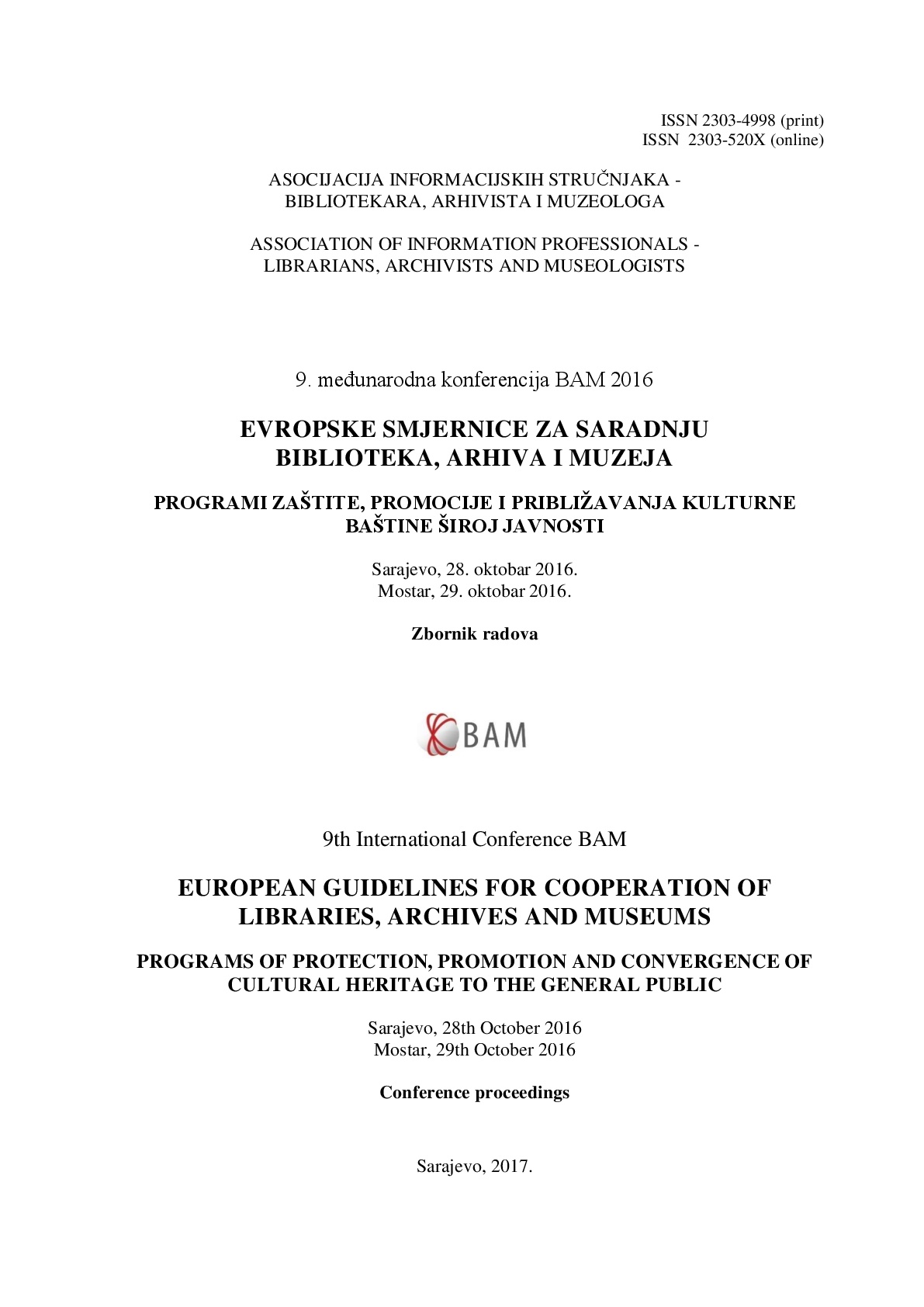
One of the most important aspects of working in heritage institutions is to know the reasons and ways of decay of the collection we care about. Each material requires certain type of microclimate so it could be able to maintain its appearance and shape over a long period of time. Conservators and curators should keep in mind that the conditions of accommodation and presentation must be optimal for a particular type of material. In addition it is important to understand the reasons of deterioration, their frequency, and its impact to the museums and their collections. It is important to identify the types of disasters that can appear at institutions and thus find an appropriate way to react in accordance with them. It is important to be aware of potential critical - catastrophic scenarios and to find appropriate ways to eliminate or to diminish them.
More...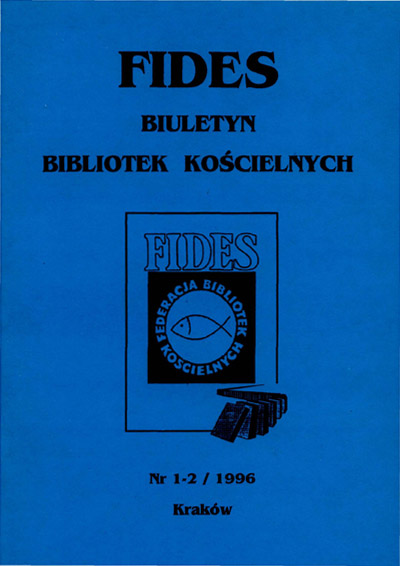
W dziale rękopisów Biblioteki Seminarium Duchownego we Włocławku znajdują się 724 dzieła w 742 wol. Na zbiór ten złożyły się manuskrypty, które dostały się tutaj z różnych księgozbiorów w XIX i XX w. Do tego czasu seminaryjny zbiór rękopisów był znikomy, ale trudno dziś określić w liczbach jego wielkość.
More...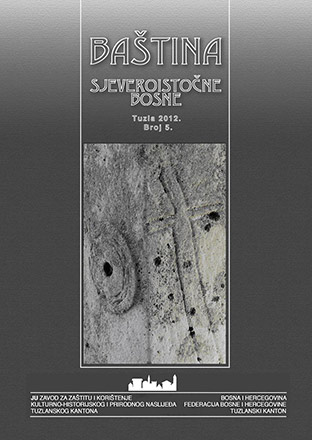
U radu je dat pregled aktivnosti JU Muzej Tešanj realizovanih u posljednje tri godine s ciljem očuvanja kulturne baštine tešanjskog kraja. Aktivnosti su realizovane kao sastavni dio projekata apliciranih na osnovu javnih poziva objavljenih kod domaćih i stranih izvora. Svaka od aktivnosti vezana je za očuvanje i prezentaciju određenog dijela kulturne baštine tešanjskog kraja. Rad sadrži i fotose koji čitaocu mogu jasnije približiti aktivnosti provedene u Muzeju Tešanj.
More...